| CLASSICAL
GAS
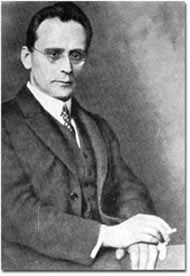
ANTON WEBERN: "He only wrote 30 pieces
of music in his life . . ."
(email to Sara Jaffe, from Weasel Walter, on the topic
of 20th Century composers)
Hi there.
Hope you're well. If you'd like, I could make you some CD-Rs
to check out. If you're really wanting to go whole hog, Amoeba
in Berkeley has tons of these kinds of records for 1-3 dollars
(!), which is where I'm getting them all. Also the public
libraries are a great source of this sort of thing for free,
because no one cares about this stuff right now.
The earliest
weird 20th century stuff that I'm really into is Arnold Schoenberg,
Alban Berg and Anton Webern - the three Austrian guys that
trailblazed 12 tone music and serialism (where rows of all
twelve chromatic notes are used before they are repeated,
etc.) They sort of upped the ante of dissonance after 1920
or so (their earlier works are more trad sounding). I like
Webern's instrumental stuff the best of the three composers.
It's very fractured and angular, but quiet and full of spaces.
He only wrote 30 pieces of music in his life, but they're
all pretty weird. Schoenberg and Berg are more of a musical
mixed bag: they wrote chamber music, operas, string quartets
and I guess it depends on what format you like the best. I
don't really care for the opera stuff personally. Stravinsky's
"Rite of Spring" is really crazy and can be bought
for a dollar anywhere. The second side is really fast and
chaotic. I can't really vouch for anything else he did, but
his stuff is always at the library.
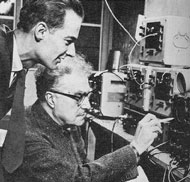
EDGARD VARESE: Making "Poeme Electronique"
(1958).
Edgard Varese was a french guy that moved to America and he
definitely wrote some early, intensely abstract modernistic
music. He only finished about 14 works in his life, but they
are all bizarre and cacophonous, particularly from 1924 on.
All of his stuff is highly recommended and easy to find. He
utilized taped musique concrete noise, massed percussion (including
hammers and anvils) and hardly ever used strings. In particular
George Antheil's "Ballet Mechanique" seems like
an extrapolation on some of Varese's pioneering techniques,
although he was working concurrently.
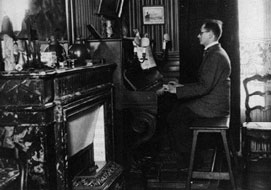
OLIVIER MESSIAEN: Possibly transcribing bird
calls in this picture.
The french composer Olivier Messiaen started writing really
crazy stuff from the 1930's on -- first he sort of focused
on these really strange, dissonant solo pipe organ compositions
like "L'Ascension", which is total Herman Munster
music. His 1945 composition "Petites Liturgies De La
Presence Divine" is really great - a long rhythmic piece
with jarring starts and stops and sour tonal clashes that
sound oddly like early Residents at times. It sounds like
the devil decided to make some music to poke fun at Jesus
or something. Messiaen was known for synthesizing Gamelan
percussion influences and also for using tons of transcribed
bird calls (!) in his music. His stuff is pretty much great
after 1945, but you just have to watch for what format - for
example, he has a two album set of solo piano birdcall material:
if you don't want to hear an hour and a half of piano playing,
it's not for you (or me for that matter). Other good ones
include "Et Exspecto Resurrectionem Mortuorum",
"Couleurs De La Cite Celeste", Turangalila Symphony,
"Seven Haikai" and "Chronochromie".
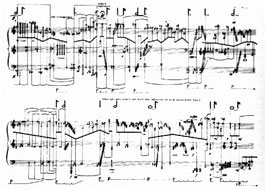
KARLHEINZ STOCKHAUSEN: From the score for "Klavierstuck
X" (1954).
Stuff
picked up in the '50s with the German Darmstadt University
composers. These guys were really into carrying on the flag
of serialism and their early stuff is great, esp. Stockhausen's
"Zeitmasse", "Gruppen" and "Carre"
(the last two are for multiple orchestras playing at once
and they're really sick) and Boulez' "Le Marteau sans
Maitre". Very atonal, arrythmic pieces that are precisely
notated and incredibly complex. Boulez is a legendary conductor
and it's good to look for stuff that he's done in general,
especially if it's modern composers. I'm no expert on Stockhausen,
but he seemed to get more abstract and kind of hippy-ish as
time went on.
The killer
is Iannis Xenakis. He's the shit. I love him. He wrote about
140 pieces in his life and I have 80 of them. He really took
music into incredibly abstract areas, fusing scientific intellectualism
with violent sonic viscera. His stuff from the 50s and 60s
is pretty much all killer: "Metastaseis", "Pithoprakta",
"Eonta", "Bohor", "Akrata",
"Atrees", "Nomos Alpha", "Nomos Gamma",
etc. He based some of his writing off of laws of probabilities
and physics i.e. rhythmic placement utilizing the distribution
of molecules in a mass of gas, etc. It sounds very pretentious,
but the results are remarkable (not to mention that he believed
in altering the results to taste if it would make them sound
better). His earliest music is truly alien, but all of it
is extremely weird and fucked up. I pretty much recommend
everything he ever did, but his first two decades were impeccable.
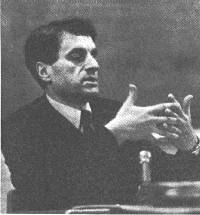
IANNIS XENAKIS: The interconnectedness of all
things.
Xenakis' noisy m.o. influenced a school of Polish composers
like Penderecki and Ligeti. Penderecki's stuff is very macabre
and his 50s and 60s works are all worth hearing, particularly
"Threnody for the Victims of Hiroshima" (52 violins
screeching away at full blast) and "Capriccio" (with
some truly insane violin solos over horror movie dissonance).
Ligeti is more texturally oriented and less bombastic.
I'm less
into the American composers like Cage, Feldman, Crumb, et
al.: they are more abstract, but generally less powerful and
more sonically diffuse in my opinion. Cage is into philosophical
matters and randomness, but he's written incredibly diverse
music. Feldman's work is generally extremely quiet and minimal.
Crumb's "Black Angels" is pretty wild, featuring
amplified string quartet. Harry Partch was the great american
composer who devised a 43 tones to the octave scheme and made
a battery of instruments to utilize it. All of his stuff is
crazy, but "The World of Harry Partch" and "On
the Seventh Days the Petals Fell Upon Petaluma" are my
favorites. Some of his music gets opera-like and a bit stupid,
but he's definitely an interesting composer. Reich and Glass
are a bit to conventionally tonal for my ears although their
rhythmic ideas are very interesting. Ives was an earier US
composer that people ignored until he was dead. He wrote a
bunch of music that incorporated rude, annoying quotations
and jokes and sour dissonance at random. I like his second
string quartet and his fourth symphony in particular (in the
latter, two orchestras play music in totally different keys
and tempos at once).
That's sort of the main stuff I"m interested in right
now . . .
ww
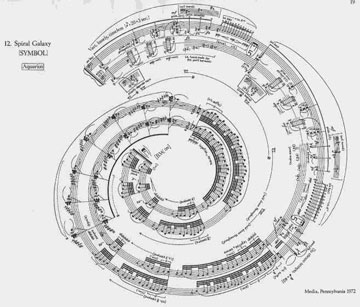
GEORGE
CRUMB: Score for "Spiral Galaxy (Aquarius)" (1972).
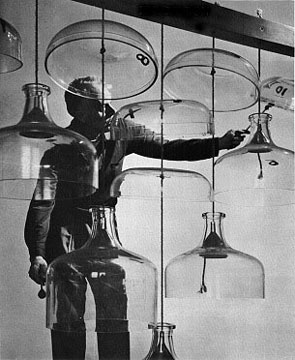
HARRY PARTCH:
And some people just play the trombone . . .

|